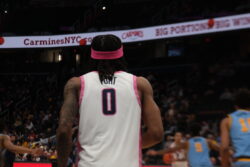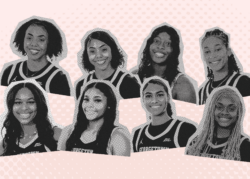The office of Men’s Lacrosse head coach Dave Urick is littered with everything lacrosse. Helmets and sticks are strewn everywhere, team shirts that read “Monday!” on the back (a reminder of the day on which the NCAA Finals fall) and rows upon rows of team pictures. There are also pictures of Urick with players from his extremely successful tenure as head coach of the program, which is currently ranked No. 5 in the nation heading into a huge showdown this Saturday on Harbin Field against No. 2 Syracuse. Urick’s boys have already secured their fifth straight berth in the NCAA Tourney, but this game Saturday may have huge seeding implications.
As you wander around the office, casually glancing at everything, trying to take it all in, one thing becomes readily apparent: his desk. It is covered with lacrosse strategies, a giant Scrabble game containing such players as “Bird” and “Rover.” One thing becomes readily apparent?Dave Urick understands lacrosse. In fact, he lives and breathes lacrosse.
Frankly, we all know that popularity drives the man. And to be popular in this late May 2001 stage of your life, you need to know something about lacrosse. Ah ? that’s where the Voice comes in. We sat down and have a head-to-head with Urick about some key issues in the games.
Take the team’s most recent victory, a 17-5 weed-whacking of Rutgers to clinch an automatic berth into the tourney. Rutgers is powered by one of the best attackers in all the land, Keith Cromwell, but this didn’t phase Urick. He simply placed sophomores Brant Gresham and Pat Collins on Cromwell, who then got only one shot on goal for the entire contest.
“With lacrosse, a lot of people don’t understand it, but you can draw parallels to a lot of other sports,” explained Urick. “Obviously it’s very similar to hockey, because lines are always changing on the fly and it’s extremely physical. It’s so crazy out there on the sidelines, with lines changing in and out all game. It’s similar to basketball, because the entire game is played in transition and the defensive aspects are similar.”
“What we did against Rutgers was we locked off Cromwell by putting one of our defenders, either Gresham or Collins, face to face with him and making sure they deny him access to the ball. Sometimes, like in basketball, we did double team but that’s more of a reaction than a set defense. One time in the Rutgers game, Cromwell had his back to Collins a little too long, and Collins reacted and came in from the back for the double team, and Cromwell had nowhere to go with the ball. We use double teams sometimes, but they’re not featured.”
And yes, it can all come back to hockey. In lacrosse, penalties are handed out, creating “man-down” situations, or power plays for the team not receiving the penalty.
“Against Rutgers, in man-down situations, we basically had to roll the dice on whether to try and keep preventing Cromwell. I decided that we would keep defending him, basically telling Rutgers I wanted to play four-on-five rather than five-on-six. It was a ‘pure deny’ situation and we limited him getting the ball. He barely got any touches.”
That’s great. So what if defense wins championships? Offense gets you women. How does Urick’s offense function differently?
“Offense is actually pretty separate from defense,” explained Urick.
“With offense, you really take what the defense gives you. This season, we’ve seen a lot of the same looks from defenders. Basically, against us, everyone slides to the ball. The best way to counter that is to draw the slide then move the ball rapidly so that eventually, the slide gets tired and you have a high percentage shot.”
In terms of moving the ball, Urick singled out senior midfielder Steve Dusseau, the team’s leading scorer this season. Dusseau, whom Urick calls “one of the better players in the country,” is an excellent dodger of the defensive slide. He distributes the ball to the other midfielders and attackers with relative ease.
“With Steve, maybe we need two or three passes from his original one before we score, but he almost always starts something up.”
Dusseau showed his importance to the team against Rutgers, when he scored four consecutive goals between the end of the first period and the beginning of the second. He did this when Georgetown held only a two-goal lead and their eventual 17-5 victory was very much in doubt. He was the catalyst for their entire later game offense outburst.
“In lacrosse, because the game keeps changing so much, you need to dance with your strongest suit,” explained Urick. “I think last year, we tended to be more attack-laden, but this year, we have two senior midfielders in Scott Doyle and Steve who make it very hard for other teams to match up. We create so many mismatches all the time just because those two guys can do anything down there.”
This Saturday, the Hoyas will get it on with the Orangemen, who defeated them in the NCAA Tournament last spring. In order to win this game, the face-off circle is going to be very important. Syracuse’s face-off artist is one of the best in the NCAAs, and Urick plans to counter with Sean Carten, who faired well against the same face-off specialist at last year’s NCAAs.
“Faceoff means possession and who is going to have the ball,” explained Urick. “If we lose a lot of faceoffs, that means they’ll be offense more. I don’t want to rely on our defense to be stripping the ball and pushing it back upfield, because they will get tired and Syracuse’s offense is good enough to get away from you. We need to stay competitive on faceoffs on Saturday. We’ll try some different things in that circle.”






